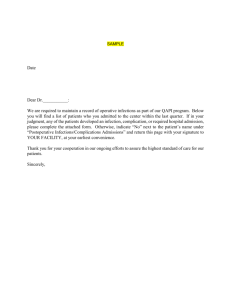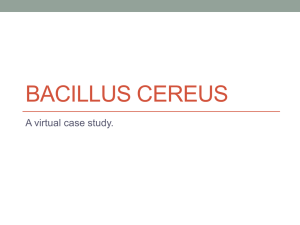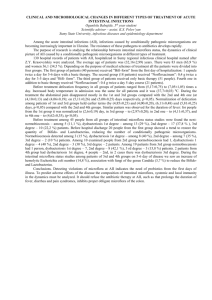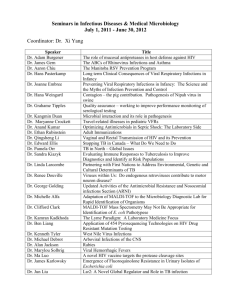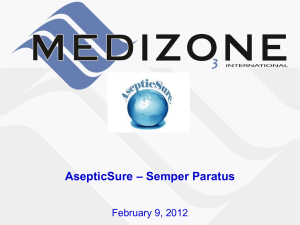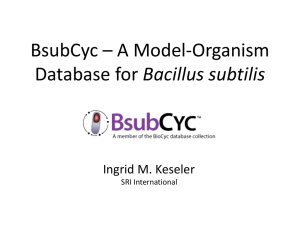efficacy - BEGG AND CO
advertisement
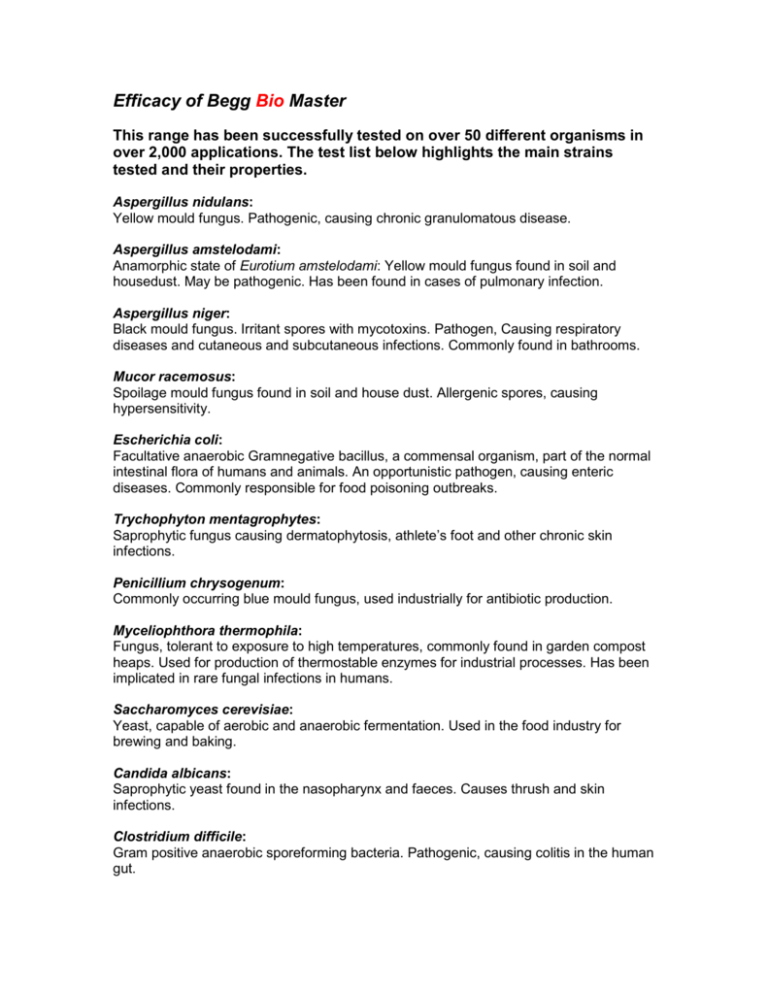
Efficacy of Begg Bio Master This range has been successfully tested on over 50 different organisms in over 2,000 applications. The test list below highlights the main strains tested and their properties. Aspergillus nidulans: Yellow mould fungus. Pathogenic, causing chronic granulomatous disease. Aspergillus amstelodami: Anamorphic state of Eurotium amstelodami: Yellow mould fungus found in soil and housedust. May be pathogenic. Has been found in cases of pulmonary infection. Aspergillus niger: Black mould fungus. Irritant spores with mycotoxins. Pathogen, Causing respiratory diseases and cutaneous and subcutaneous infections. Commonly found in bathrooms. Mucor racemosus: Spoilage mould fungus found in soil and house dust. Allergenic spores, causing hypersensitivity. Escherichia coli: Facultative anaerobic Gramnegative bacillus, a commensal organism, part of the normal intestinal flora of humans and animals. An opportunistic pathogen, causing enteric diseases. Commonly responsible for food poisoning outbreaks. Trychophyton mentagrophytes: Saprophytic fungus causing dermatophytosis, athlete’s foot and other chronic skin infections. Penicillium chrysogenum: Commonly occurring blue mould fungus, used industrially for antibiotic production. Myceliophthora thermophila: Fungus, tolerant to exposure to high temperatures, commonly found in garden compost heaps. Used for production of thermostable enzymes for industrial processes. Has been implicated in rare fungal infections in humans. Saccharomyces cerevisiae: Yeast, capable of aerobic and anaerobic fermentation. Used in the food industry for brewing and baking. Candida albicans: Saprophytic yeast found in the nasopharynx and faeces. Causes thrush and skin infections. Clostridium difficile: Gram positive anaerobic sporeforming bacteria. Pathogenic, causing colitis in the human gut. Corynebacterium spp: Grampositive, non sporeforming bacilli. Pathogenic, causing a variety of cutaneous and mucocutaneous human diseases such as diphtheria, mastitis, vaginitis etc. Corynebacterium minutissimum: Grampositive non sporeforming bacillus. Pathogenic, associated with acne. Enterobacter gergoviae: Gramnegative bacillus. Pathogenic, associated with hospital acquired urinary tract infections. Escherichia coli 0157 H7: Facultative anaerobic gramnegative bacillus serotype, found in animal intestines and faeces. Strain 0157 H7 is particularly pathogenic, causing gastroenteritis, sometimes fatal. Klebsiella pneumoniae: Aerobic Gramnegative bacillus, part of the normal intestinal flora of animals and humans. Pathogenic, causing hospital and community acquired infections. Listeria monocytogenes: Grampositive aerobic non sporeforming bacillus, found in the intestinal tract of humans. Pathogenic if it enters the bloodstream, causing Listeriosis. Mesophilic aerobes: Most bacteria are mesophiles, i.e. capable if living and replicating at a wide range of temperatures. Those found in or on the human body have a temperature optimum of 37 0 to 44 0 C, but many others in found in nature have an optimum of 30 0 C . Proteus mirabilis: Aerobic Gramnegative bacillus, part of the normal human intestinal flora. Pathogenic, causing urinary tract and intestinal infections. Proteus vulgaris: Aerobic Gramnegative bacillus, part of the normal human intestinal flora. Pathogenic, causing urinary tract and intestinal infections. Pseudomonas aeruginosa: Aerobic Gramnegative bacillus, colonies forming a characteristic blue green pigment with a urine like odour. Ubiquitous in nature. Pathogenic, being a major cause of hospital acquired infections. Pseudomonas cepacia: Aerobic Gramnegative bacillus. Pathogenic, associated with many hospital acquired infections, and closely associated with cases of cystic fibrosis. Pseudomonas putida: Aerobic Gramnegative bacillus. Some strains occasionally isolated as opportunistic pathogens. Staphylococcus aureus: Aerobic Grampositive coccus. Part of the normal flora of the skin, intestinal and genital tracts and mucous membranes of warm blooded animals. An opportunistic pathogen causing a wide variety of infections. (MRSA) Methicillin Resistant Staphylococcus aureus: At the moment there are 27 known pathogenic serotypes of MRSA, each particularly contagious, and resistant to most antibiotic treatments. Common in hospital acquired infections. Salmonella enteritidis: Gramnegative bacillus, with over 1000 known pathogenic serotypes, causing enteric or typhoid fever in humans. Found in the gut of animals, birds, and human carriers. Infection is passed through poor hygiene.
